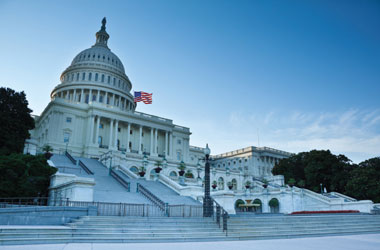
February 15, 2020
Budget deal boosts federal veterinary programs
Updated February 10, 2020
 Five days before Christmas, President Donald Trump signed off on a $1.4 trillion budget deal containing several gains for veterinary medicine.
Five days before Christmas, President Donald Trump signed off on a $1.4 trillion budget deal containing several gains for veterinary medicine.
“There are a number of very significant wins for the veterinary profession in this spending bill, which is noteworthy, considering the current difficult environment for appropriations,” said Dr. Kent McClure, chief government relations officer for the AVMA.
The budgets for three of the AVMA’s top federal funding priorities were maintained at current levels, reflecting increases that had been secured in recent spending bills, Dr. McClure said.
The Veterinary Medicine Loan Repayment Program was maintained at $8 million for fiscal year 2020. The VMLRP pays up to $25,000 each year toward repayment of qualified educational loans of eligible veterinarians who agree to serve in a National Institute of Food and Agriculture–designated veterinarian shortage situation for three years.
The Veterinary Services Grant Program received a half a million–dollar bump in fiscal year 2019 to $3 million, which is maintained for FY 2020, which began Oct. 1, 2019. The program aims to relieve veterinarian shortage situations and support veterinary services in rural and agricultural communities.
Appropriations for the Food Animal Residue Avoidance Databank were maintained at $2.5 million for FY 2020, which is the maximum funding amount designated in the authorizing legislation. The university-based FARAD is a national program that serves as the primary source for scientifically based recommendations regarding safe withdrawal intervals for drugs and chemicals used in food-producing animals.
A legislative package attached to the budget deal included the Setting Every Community Up for Retirement Enhancement Act, the broadest piece of retirement legislation passed by Congress in more than a decade. The new law does many things, including removing barriers for small businesses to band together to offer competitive retirement plans to employees, also known as association retirement plans. This provision was lobbied for by the AVMA.
The comprehensive budget deal contained additional provisions concerning animal welfare and veterinary medicine. Following are a few highlights:
- Increasing funding for the Department of Agriculture’s Animal and Plant Health Inspection Service Service for a total of $1.042 billion in FY 2020. APHIS veterinary diagnostics and the APHIS Center for Veterinary Biologics were boosted by $7.2 million and $1 million, respectively.
- Providing funding for enforcement of the Horse Protection Act at $1 million—an increase of more than 20%—further enabling the USDA to enforce federal laws against horse soring.
- Providing $500,000 in funding to address pentobarbital in pet food.
- Directing the USDA to restore animal welfare inspection reports and Horse Protection Act violations on its website.
- Conditionally providing $21 million in new monies to the Bureau of Land Management for management of its Wild Horse and Burro Program.
- Spending $2 million on a grant program to help domestic violence shelters accommodate pets. The program was authorized in the Pet and Women Safety Act, which was signed into law as part of the 2018 Farm Bill.
Correction: An earlier version of this article inadvertantly transposed the FY 2020 appropriation amounts for two of the Department of Agriculture’s Animal and Plant Health Inspection Service programs.
Related JAVMA content:
USDA awards $2.9M in 2019 to support rural veterinary services
BLM board endorses AVMA, AAEP policy on herd management
Horse soring bill passes the House
USDA awards $7M for loan repayment to address shortage areas
When domestic violence arrives at the clinic door
Pets to live in apartments at new domestic violence shelter
FDA issues alert about pentobarbital contamination in dog food
APHIS pulls welfare information from website